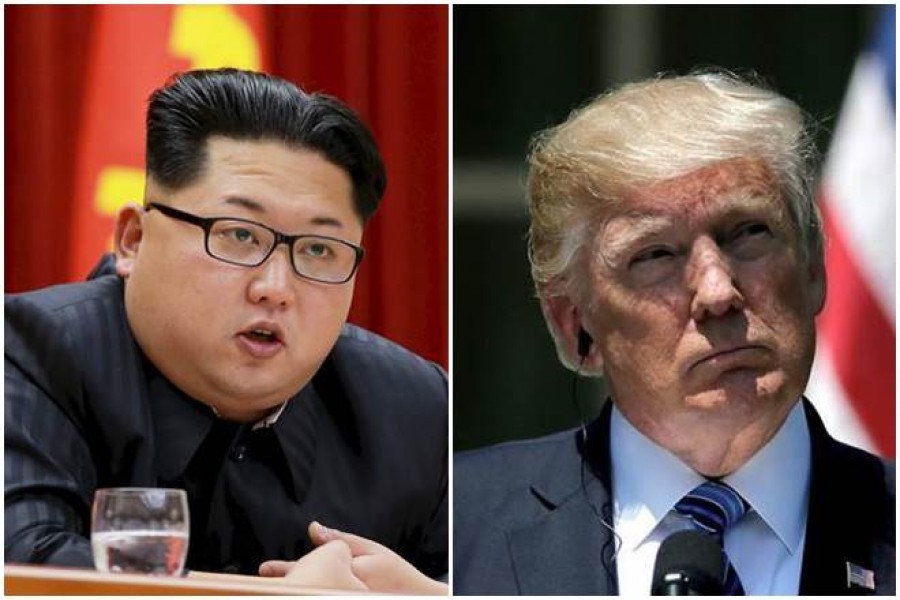One must give credit to US President Donald J. Trump for getting to do what no previous White House resident could (or would) do: sit down with North Korea's Kim Jong-un for de-nuclearising talks. Yet no previous presidents faced North Korea's nuclear capabilities graduating to the inter-continental level, directly threatening the United States. Just for this feat, Trump could dub his Far East counterpart 'Rocket Man' with the same upbeat tone as Elton John singing a song of the same name.
Separating fact from fiction is a useful start to comprehending this much-needed interlude at a time of widespread brinkmanship, both between groups within state and between countries abroad. US naval gate-keeping around Korean waters was not the reason why Kim caved, if indeed he waved the peace signal: even a deployed armada could prevent Kim from testing his latest toys. Then there were sanctions, new ones. Yet North Koreans have lived for so long with sanctions, it is unlikely that is why the thaw.
Rather than US sanctions, Chinese pull-out damaged the North Korean economy; and though China and the United States have directly negotiated with each other at the very top, China was not acting on behalf of the United States. Withdrawing Chinese factories from the North Korean border fitted a global industrial redistribution China has no choice but to take given the disappearing low-wage advantage it once enjoyed; but mostly, these withdrawals were not completed or comprehensive enough, leaving plenty of Chinese collaboration for North Korea to stay above water: an economically sinking North Korea is not in China's interest, as too any conflict, particularly a US-anchored conflict.
An economically collapsing North Korea is also not in South Korea's interest, and specifically under the North Korean-born President Moon Jae-in, who campaigned for defusing Korean tensions. Putting China's economic pressure, Moon's 2017 election, and the 2018 Pyeongchang Olympics, all the opportunities for resuming dialogue were suddenly present and yearning. Kim seized the opportunity, in part to release the mounting economic hardships, in part to utilise Moon's warm gestures, and in part to allow time to his scientists to plan and coordinate future strategic-weapons developments.
It was a splashy North Korean return to international relations, these splashes coming not from tested nuclear missiles returning into the ocean, but in how a 'united' Korean Olympic participation caught the rest of the world off-guard. Apparently a lot more was done during Vice President Mike Pence's South Korean visit for the Olympics opening ceremony and Ivanka Trump's similar visit for its closure, but without a Moon there may not have been enough light to facilitate a Trump-Kim summit. Without China's quiet intervention, Trump might not have made as much noise.
Similarly, behind the natural euphoria, one must not start partying as yet. Past patterns ring louder under such circumstances than in routine life; and they remind us not only how North Korea, escaping a similar negotiations moment, simply walked out in 2005, but also that no outsider knows for sure what North Korea has, how well oiled its nuclear arsenal is and why past negotiations have not translated in opening up North Korean society. It is unlikely a Kim-Trump parley will change this enormously sensitive status quo, clearly not in a blink. One worse-case scenario: Kim may be trying now what his father did in 2005, simply stalling negotiations and utilising them to facilitate nuclear refinements and upgrading.
Yet, the 2018 outcome may not be the same as in 2005. North Korea stands a lot sturdier in international posturing today than then; it has been more ably protected this time by China and Russia than ever before; its own economy is in less dire straits than before; and it has a southern counterpart whose dialogue priority provides just the opportunity for Kim to seize to upgrade his weaponry.
He may also be a less reclusive leader than his father and grandfather; and by using his sister to initiate the Korean rapprochements, Kim may be signalling greater external openings and selective domestic thaws. In and of themselves, they may not be sufficient to launch a brand new era in the way President Ronald Reagan's 'tear down this wall' did to Mikhail Gorbachev in June 1987.
For a start, Kim is no Gorbachev: the latter, who inherited an evaporating superpower, overspent and outmanoeuvred by its adversary's 'Star Wars' transition, and financially completely insolvent, had a vision to restructure his country (glasnost, perestroika) that Kim does not, in fact, have. Opening North Korean society would automatically pull the rug beneath his leadership.
Nor should the Kim-Trump hobnobbing be expected to follow the Iraqi route. One recalls how, to prevent Saddam Hussein from returning Kuwait, President George H.W. Bush first sought dialogue, with Secretary of State James Baker meeting Tariq Aziz, his more celebrated Iraqi counterpart, on January 09, 1991. Smiles and relief gave way, in only 10 days, to Operation Desert Storm, Iraq's eviction from Kuwait, and the continued US occupation from 1991, determined to completely dismantle nuclear weapons and jihadis, in that order.
North Korea cannot be like Iraq because of its location: Chinese troops massively pushed General Douglas MacArthur's troops from the Yalu River in 1950 almost to the South Korean peninsula tip, before truce descended along the 38th Parallel from 1953. Trump would be foolish to ignore that outcome.
Relishing the company of a dictator or any populist the way Trump did Egypt's Abdel Fattah el-Sisi, Israel's Benjamin Netanyahu, Russia's Vladimir Putin, and Saudi Arabia's monarch, may remain the most important context in this dialogue: much more will be announced and promised, but past behavioural and ideological patterns indicate it will take time for that reality to prevail, the very time Kim's generals need for upgrading their arsenal.
Dr. Imtiaz A. Hussain is Professor & Head of the newly-built Department of Global Studies & Governance at Independent University, Bangladesh.


